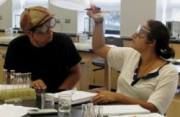On Tuesday, Nov. 16, Penn State Worthington Scranton formally dedicated its new, $3.1 million dollar Science Suite, which is comprised of three new science labs at the campus for biology, chemistry and physics.
The project was made possible by a combination of funding sources including private support from several alumni, businesses, local foundations and individuals, including Penn State faculty and employees.
The new labs contain ultra-modern teaching and student workstations that allow for more interactive, collaborative learning and research capabilities, as well as technologically advanced equipment.
The biology and chemistry labs are also equipped with video-conferencing capabilities, allowing local faculty and students to interact and participate with science professionals and educators from around the world.
In fact, during the tours of the labs, individuals were able to observe video conferencing from the Sanger Institute, a genomic research center in the United Kingdom.
Dr. Mary-Beth Krogh-Jespersen, a former chemist herself, spoke of her excitement at seeing the new labs come online and being used by the students and faculty, who now have the advantage of working in new, state-of-the-art facilities.
"Our current and future students now have the benefit of not only having extremely gifted and dedicated faculty members teaching them and the resources of a Big 10 University behind them, they also have a top-notch facility to work in as well," she said.
The Science Suite project has generated much excitement among Worthington Scranton's students, staff, faculty and administration and it was also instrumental in the campus' efforts to establish a four-year baccalaureate degree program in science this year, making Worthington Scranton one of only two Penn State commonwealth campuses to offer this degree.
"Our first science majors have already been recruited, we have expanded our science faculty, and we look forward to putting the new facilities you are about to see today to great use - through both teaching and research," Dr. Krogh-Jespersen said.
